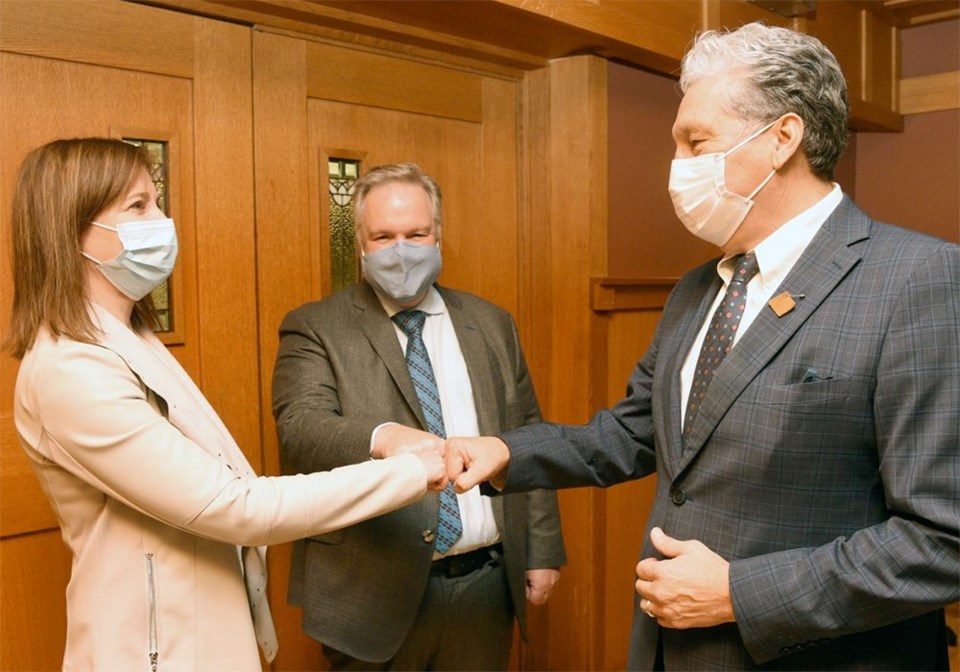The Global Agri-Food Advancement Partnership (GAAP) in Saskatoon is intended to assist agri-food businesses advance their technologies to market adoption.
The not-for-profit organization is a partnership between Ag-West Bio, the Global Institute for Food Security (GIFS), Innovation Place and the Saskatchewan Food Industry Development Centre. It was created to help emerging companies in the agri-food sector gain access to facilities, training, mentorship, concierge services and investment over a three-year project period.
“The GAAP is a success story of academia, government, not-for profits and industry working together to develop the innovation system,” Ag-West Bio chief executive officer Karen Churchill said during a news conference Nov. 12.
She said the founding team determined that a large piece was missing in the innovation pipeline — motivation to make the necessary connections to develop the technology ecosystem and grow ag businesses in Saskatchewan.
“The partners each brought strengths. We all recognized where there were struggles and we were trying to get innovation at the consumer stage. Each of us had something to offer, and that is what inspired us to decide to actually move ahead and do something,” she told reporters.
“We offer a novel platform designed to address those unique challenges. Traditional accelerators do not work in the agri-food space, which is why we needed to create a unique answer.”
She said one of the main objectives is to help start-up companies make it through “the valley of death,” where they are unable to attract venture capital but are beyond start-up investment.
“The missing piece of our puzzle will be filled by the GAAP,” she said.
“It will extend that runway to success by providing the guidance and support coupled with the physical space to blossom in a reduced burn rate environment surrounded by innovation.”
Daniel Vandal, federal northern affairs minister responsible for Prairies Economic Development Canada (PrairiesCan) and the Canadian Northern Economic Development Agency, was in Saskatoon Nov. 12 to announce $1.5 million in funding for GAAP.
The investment is through PrairiesCan in Saskatchewan under the Regional Innovation Ecosystem program.
“The world wants and needs what Saskatchewan produces,” he said.
“We have right here a culture of innovation and the right skill sets and tools to leverage emerging opportunities. A great example is tackling the challenge meeting the increasing demands and needs for food products by the global population.
“The pandemic has highlighted many of the inadequacies of the global food systems and supply chains. It has meant we’ve had to innovate to adapt to increase productivity. Meeting this challenge requires investment in new agri-food technologies and the companies which will develop them.”
GIFS CEO Steven Webb said Saskatchewan is well positioned to be a key player in agri-food and biotech innovation because of its agricultural depth and role as a consistent supplier of high-quality food ingredients.
“Innovation is a team sport, and we have a deep bench here in Saskatchewan,” he said.
“There’s no doubt in my mind that agriculture is a solution to climate change. Innovation in agriculture is a solution to economic growth. It’s a solution to environmental challenges that we face, and it can build a more sustainable future.”
However, GAAP partners recognized that agri-food companies have many challenges and don’t have the usual issues faced by many other start-ups.
“They often need highly specialized equipment, staff, have high upfront costs, and face a long road to market entry and revenue generation,” Churchill said.
“This is why the GAAP is unique. No other organization provides what we are proposing. The GAAP is not just an accelerator. It is not just funding. It is not just an incubator. It is a combination of all of these things and more.”
GAAP is a separate entity with its own facility and staff.
“We hope to have as many as 30 companies come through the GAAP over a 20-year lifetime,” she said.
“Hopefully it continues past that, but that is the initial plan.”
Negotiations are underway with the first company, which Churchill expects will be announced in January.

